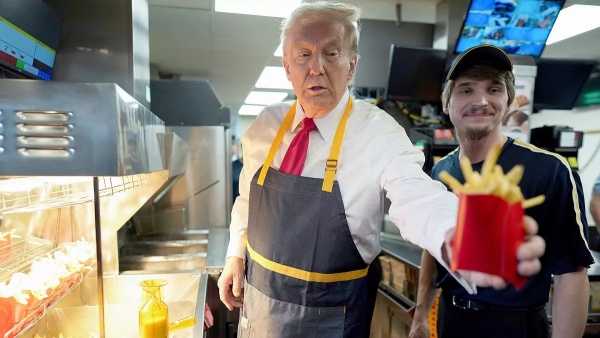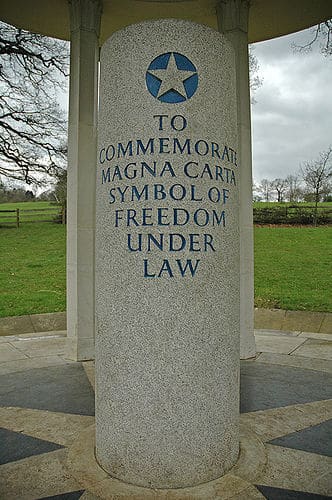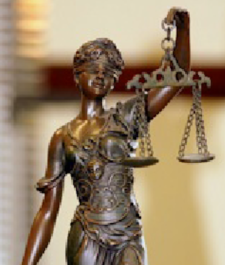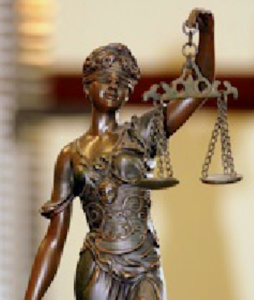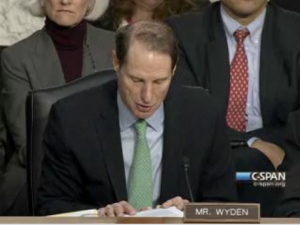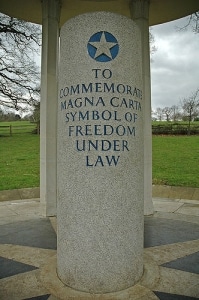
The Magna Carta Monument, Runnymede England
I am annoyed by folks who claim to love history and are blind to it. I am disgusted by folks who claim to love history, are willfully blind to it, and in their willful blindness try to use their power to inflict damage on others.
Why yes, I *did* listen to the oral arguments at SCOTUS today. Why do you ask?
sigh
Here’s an exchange between Justice Alito and Michael Dreeben, speaking for the government:
JUSTICE ALITO: Mr. Dreeben, you dispute the proposition that a former president has some form of immunity.
MR. DREEBEN: Mm-hmm.
JUSTICE ALITO: But, as I understand your argument, you do recognize that a former president has a form of special protection, namely, that statutes that are applicable to everybody must be interpreted differently under some circumstances when they are applied to a former president.
Isn’t that true?
MR. DREEBEN: It is true because, Justice Alito, of the general principle that courts construe statutes to avoid serious constitutional questions. And that has been the longstanding practice of the Office of Legal Counsel in the Department of Justice.
JUSTICE ALITO: All right. So this is more, I think, than just a — a quarrel about terminology, whether what the former president gets is some form of immunity or some form of special protection because it involves this difference which I’m sure you’re very well aware of.
If it’s just a form of special protection, in other words, statutes will be interpreted differently as applied to a former president, then that is something that has to be litigated at trial. The — the former president can make a motion to dismiss and may cite OLC opinions, and the district court may say: Well, that’s fine, I’m not bound by OLC and I interpret it differently, so let’s go to trial.
And then there has to be a trial, and that may involve great expense and it may take up a lot of time, and during the trial, the — the former president may be unable to engage in other activities that the former president would want to engage in. And then the outcome is dependent on the jury, the instructions to the jury and how the jury returns a verdict, and then it has to be taken up on appeal.
So the protection is greatly diluted if you take the form — if it takes the form that you have proposed. Now why is that better?
MR. DREEBEN: It’s better because it’s more balanced. The — the blanket immunity that Petitioner is arguing for just means that criminal prosecution is off the table, unless he says that impeachment and conviction have occurred.
Oh, the horrors of forcing a former president to defend himself in a trial! So sayeth Justice Alito, he who cites a 17th century English witchburner of a jurist (who also invented the marital rape exception), in order to justify denying women bodily autonomy.
If Justice Alito is fond of citing old English judicial writings, let me walk him back another 4 centuries and introduce him to John, by the grace of God King of England, Lord of Ireland, Duke of Normandy and Aquitaine, and Count of Anjou.
Once upon a time — long before a bunch of rabble-rousing colonial insurrectionists said that “Governments are instituted among Men, deriving their just powers from the consent of the governed, –That whenever any Form of Government becomes destructive of these ends, it is the Right of the People to alter or to abolish it, and to institute new Government, laying its foundation on such principles and organizing its powers in such form, as to them shall seem most likely to effect their Safety and Happiness.” — there was a little dustup between John, by the grace of God King of England etc., and a bunch of his barons, as well as various bishops and archbishops. The barons and clergy, distressed at what seemed to them to be very ill treatment at the hand of their king, expressed their frustrations in a manner that could not be ignored.
In June 1215, John and the barons negotiated an agreement. In it, after an introduction and 60 separate clauses in which King John agreed to various reforms and promised to make specific restitution in various particular cases that were demanded by his barons, the 1215 version of the Magna Carta ends like this:
* (61) SINCE WE [ed: John] HAVE GRANTED ALL THESE THINGS for God, for the better ordering of our kingdom, and to allay the discord that has arisen between us and our barons, and since we desire that they shall be enjoyed in their entirety, with lasting strength, for ever, we give and grant to the barons the following security:
The barons shall elect twenty-five of their number to keep, and cause to be observed with all their might, the peace and liberties granted and confirmed to them by this charter.
If we, our chief justice, our officials, or any of our servants offend in any respect against any man, or transgress any of the articles of the peace or of this security, and the offence is made known to four of the said twenty-five barons, they shall come to us – or in our absence from the kingdom to the chief justice – to declare it and claim immediate redress. If we, or in our absence abroad the chief justice, make no redress within forty days, reckoning from the day on which the offence was declared to us or to him, the four barons shall refer the matter to the rest of the twenty-five barons, who may distrain upon and assail us in every way possible, with the support of the whole community of the land, by seizing our castles, lands, possessions, or anything else saving only our own person and those of the queen and our children, until they have secured such redress as they have determined upon. Having secured the redress, they may then resume their normal obedience to us.
Any man who so desires may take an oath to obey the commands of the twenty-five barons for the achievement of these ends, and to join with them in assailing us to the utmost of his power. We give public and free permission to take this oath to any man who so desires, and at no time will we prohibit any man from taking it. Indeed, we will compel any of our subjects who are unwilling to take it to swear it at our command.
If one of the twenty-five barons dies or leaves the country, or is prevented in any other way from discharging his duties, the rest of them shall choose another baron in his place, at their discretion, who shall be duly sworn in as they were.
In the event of disagreement among the twenty-five barons on any matter referred to them for decision, the verdict of the majority present shall have the same validity as a unanimous verdict of the whole twenty-five, whether these were all present or some of those summoned were unwilling or unable to appear.
The twenty-five barons shall swear to obey all the above articles faithfully, and shall cause them to be obeyed by others to the best of their power.
We will not seek to procure from anyone, either by our own efforts or those of a third party, anything by which any part of these concessions or liberties might be revoked or diminished. Should such a thing be procured, it shall be null and void and we will at no time make use of it, either ourselves or through a third party.
* (62) We have remitted and pardoned fully to all men any ill-will, hurt, or grudges that have arisen between us and our subjects, whether clergy or laymen, since the beginning of the dispute. We have in addition remitted fully, and for our own part have also pardoned, to all clergy and laymen any offences committed as a result of the said dispute between Easter in the sixteenth year of our reign (i.e. 1215) and the restoration of peace.
In addition we have caused letters patent to be made for the barons, bearing witness to this security and to the concessions set out above, over the seals of Stephen archbishop of Canterbury, Henry archbishop of Dublin, the other bishops named above, and Master Pandulf.
* (63) IT IS ACCORDINGLY OUR WISH AND COMMAND that the English Church shall be free, and that men in our kingdom shall have and keep all these liberties, rights, and concessions, well and peaceably in their fullness and entirety for them and their heirs, of us and our heirs, in all things and all places for ever.
Both we and the barons have sworn that all this shall be observed in good faith and without deceit. Witness the abovementioned people and many others.
Given by our hand in the meadow that is called Runnymede, between Windsor and Staines, on the fifteenth day of June in the seventeenth year of our reign (i.e. 1215: the new regnal year began on 28 May).
Note the third paragraph, that begins “If we, our chief justice, . . .” In that paragraph, King John, by the grace of God King of England etc., is agreeing that he and his administration are not immune from accountability.
John and the barons agreed on a process for adjudicating disputes. They agreed on a panel that could both bring charges and judge them. They agreed on how the panel should be chosen, and how the panel should select new members at the death of old ones. They agreed on how many members of the panel needed to agree in order for a judgment to be final. They agreed on a time frame for restitution. Most importantly, should John be found to have violated the terms of this document and yet refuse restitution, John, by the grace of God King of England etc., agreed that his castles and lands could be seized under order of the panel to make restitution for what he had done, or his officials had done on his behalf.
To be fair, the Magna Carta was changed and altered in the years and centuries that followed. But the original text of the original version makes it clear that even the King of England, Lord of Ireland, Duke of Normandy and Aquitaine, and Count of Anjou does not enjoy absolute immunity.
Trump may wish to be a monarch with absolute immunity and not a president.
Alito may wish to treat him as a monarch with absolute immunity and not a president.
But in a meadow at Runnymede, between Windsor and Staines, John, by the grace of God King of England, Lord of Ireland, Duke of Normandy and Aquitaine, and Count of Anjou, said no. That’s not how even a divinely appointed monarch is to be treated.


